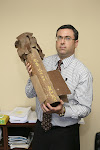The Israeli Defense Forces is looking for a few good men and women, but they have to be Americans.
Three Israelis from the nonprofit EVP, Emergency Volunteers Project, visited the area Dec. 5 and 6, to shore up volunteers, training facilities and money as part of its goal to have 2,000 American firefighters, rescue workers and other medical personnel trained and ready to deploy to Israel in the event of a crisis.
"We need to be better prepared for the next real emergency, whether it's a war or earthquake," said EVP CEO Adi Zahavi.
Israel constantly faces attacks from its neighbors, and more often, these actions are taking place not on the battlefield but rather where Israelis live, he said.
"It's not army against army. It's civilians against civilians. The main fighting is back home. The battlefield now is actually in our houses," explained Ken Kleiman, who serves in the IDF and with the Netanya Fire Department.
In the event of such battles, much of the country's citizens are immediately called up, leaving precious few to help out in Israeli cities and homes.
In a country of roughly 7.5 million people, there are only 900 active firefighters, the men said.
"If we can bring in 400 or 500 extra firefighters, it's a real help," said Gary Schiff, who is helping coordinate the American end of these efforts.
EVP officials are traveling the country, signing up volunteers who are already trained in the needed skills so they must only be trained to adapt to Israeli methods. These people must be able to deploy to Israel at a moment's notice.
So far, close to 500 Americans have been trained in Texas, Florida and New York.
"Lots of people want to help," said Zahavi, who is a First Responder in Israel.
Not only does this help Israel during emergencies, but it also "lets Israelis understand we are not alone," Zahavi said.
Northern Virginia, Montgomery County, Maryland and the District of Columbia are next, and Zahavi expects to have between 20 and 30 trained volunteers ready in the next few months.
Some of those volunteers sat through a 90-minute presentation at Kensington Fire Station #5 on Wednesday of last week.
There they learned that while Americans rush to the fire or accident scene, Israelis take a much slower, more methodical approach. Before they even begin to help out, they survey all their surroundings, looking for terrorists and bombs.
When Kleinman gets to a car fire, "I have to think, wait, am I near a market? Is it lunchtime [and therefore very crowded]?"
Different methods are used to put out fires as many buildings in America are wood-structured while it is common in Israel to have concrete buildings.
Also, the Israelis explained, they are used to dealing in crews of as little as two people to as many as five while here in America, fire crews have at least a dozen and can have 50 people involved.
Avital Cooperman, who serves with the Rockville Fire Company Station 3, said she came to the presentation, because "I'd love to be able to give back a little bit." She has lots of family in Israel, including a cousin who was called up during the recent Operation Pillar of Defense.
Other volunteers said they wanted to join up, both because they understood how much they were needed and because it seemed exciting.
So far, the recruits have been mostly Jewish or Evangelical Christians, Kleinman said.
"I don't really care if the guy who comes to save my family is Christian or Jewish, as long as he will save my family," he noted.
During a recent emergency, Kleinman said he was called away from his fire department to go into the army, leaving a six-hour period where there was only one firefighter available there. Firefighters from elsewhere in the country were sent over, but it took awhile, he said.
EVP plans to train five types of volunteers separately, although some of the training will be very similar. Teams of firefighters, medical personnel, bomb shelter workers and infrastructure workers who can rescue victims in collapsed buildings and food distributors are needed.
The goal is for the Jewish community to raise sufficient funds to cover the costs of the volunteers' deployment.
"If you are being called, everything will be covered. You just need your commitment and your skills," Zahavi said.
As the meeting drew to a close, Robert Katz, who is involved in the American end of the training, reminded those thinking of joining, "You represent your community. You represent your country as well."

